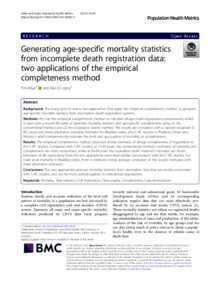وثيقة
Generating age-specific mortality statistics from incomplete death registration data : two applications of the empirical completeness method.
المعرف
DOI: 10.1186/s12963-021-00262-3
المصدر
Population Health Metrics. v. 19, 1, , 29
المساهمون
Lopez, Alan D., مؤلف
الدولة
United Kingdom.
مكان النشر
London
الناشر
BioMed Central Ltd.
ميلادي
2021-12-01
اللغة
الأنجليزية
الملخص الإنجليزي
Background: The study aims to assess two approaches that apply the empirical completeness method to generate age-specific mortality statistics from incomplete death registration systems. Methods: We use the empirical completeness method to calculate all-age death registration completeness, which is used with a model life table to generate mortality statistics and age-specific completeness using (1) the conventional method and (2) the equivalent deaths method. The results are compared with a capture-recapture (C-RC) study and three alternative mortality estimates for Brazilian states, and C-RC studies in Thailand, Oman and Vietnam, which independently estimate the level and age pattern of mortality or completeness. Results: The empirical completeness method produces similar estimates of all-age completeness of registration to the C-RC studies. Compared with C-RC studies, at 15-59 years, the conventional method’s estimates of mortality and completeness are more concordant, while at 60-84 years the equivalent death method’s estimates are closer. Estimates of life expectancy from the two approaches each have similar concordance with the C-RC studies. For male adult mortality in Brazilian states, there is relatively strong average correlation of this study's estimates with three alternative estimates. Conclusions: The two approaches produce mortality statistics from incomplete data that are mostly concordant with C-RC studies, and can be most usefully applied to subnational populations.
ISSN
1478-7954
قالب العنصر
مقالات الدوريات

